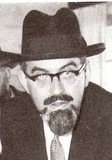Kopel Kahana
The following article by Rabbi Raymond Apple appeared in Rivon, the quarterly magazine of the Hampstead Synagogue, February, 1970, vol.7, no.3.
 A remarkably retentive memory. A sharp, penetrating mind. A gift of clear exposition in speech and with the pen. Warm human sympathy and quick wit.
A remarkably retentive memory. A sharp, penetrating mind. A gift of clear exposition in speech and with the pen. Warm human sympathy and quick wit.
It could be some eminent judge that I am describing. It could also be a Gadol BaTorah — a giant in rabbinic learning.
Indeed, in Rabbi Kopel Kahana the two — the master of jurisprudence and the Jewish sage — meet and combine harmoniously to produce a unique personality, respected by lawyers and revered by Rabbis the world over.
Rabbi Kahana was born in Poland in 1895. He served as Rabbi in Bialowiza and Rozonoi and acquired a reputation as an illui — a brilliant scholar and teacher of Talmud and rabbinics.
He never spoke much to us, his students, about that period in his life, but every now and then he would tell us of the answer he gave to a particular she’elah, or the way he solved a specially difficult problem in Talmudic dialectics, and we would at once see exemplified the human compassion and the art of clear thinking with which we, in such a different context, had come to associate him.
He came to England just before the outbreak of the last war. By the end of the war he had not only learnt English (and he learnt it well enough to be able, in later years, to correct his English-born students’ lapses in English literary style) but he had immersed himself in what one might have thought the improbable atmosphere of Cambridge and he had already begun to be known as an academic lawyer specialising in comparative law.
From this time onwards, his articles and studies on a variety of legal subjects have appeared — in impeccable English — in the legal journals. His books have been enthusiastically received as contributions to legal literature often bringing a novel and important slant to bear on problems of jurisprudence.
And some of his writings have been translated into other languages: indeed on a holiday in Spain a few years ago “Professor Kagan” found himself a celebrity as the author of a monograph well-known to and considered authoritative by Spanish lawyers in its Spanish translation.
In Jewish law, English law, Roman law he is equally at home and equally a master. The three systems were compared and contrasted in his first main work, “Three Great Systems of Jurisprudence”. His knowledge of legal systems reinforced his belief that Jewish law contained enough potential to be able to govern Israel with efficiency and justice, and he argued the point powerfully in his second book, “The Case for Jewish Civil Law in the Jewish State”.
Seeing the amount of prejudice that was and is prevalent against Jewish marriage law, he got to work in “The Theory of Marriage in Jewish Law” to expound the Jewish concept of marriage and to correct misconceptions concerning it. The theme of this book is being treated in comprehensive detail in a further work on which he is now engaged, and which will probably be entitled “Personal Status in Jewish Law”.
From 1946-68 he had charge of the Rabbinical Diploma Class at Jews’ College.
Officially he taught his students Talmud and Codes. In fact he was able to exert the really memorable kind of personal influence for which the select band of truly great teachers are renowned. His students found their outlook on many things, private as well as communal, moulded and guided by him. And he, for his part, was frequently able to help a student or former student through a problem by means of shrewd, effective approaches to a variety of powers-that-be.
To honour him on his retirement, Jews’ College conferred upon him the title “Professor Emeritus”. He was guest speaker at the College speech day in 1968. His address was typically Rabbi Kahana. At one moment he had his audience marvelling at his intellectual prowess. At the next he had them spellbound with an effective piece of homiletics. And tucked in everywhere came his obiter dicta, the witty asides that brought a roar of delighted laughter.
Like my contemporaries and those who preceded us in his Class. I deem myself fortunate to have sat at his feet. And like many people in England, Israel and elsewhere, I wish him a long and happy retirement in which further to enhance a unique reputation.
* Rabbi Kahana passed away in 1978.



